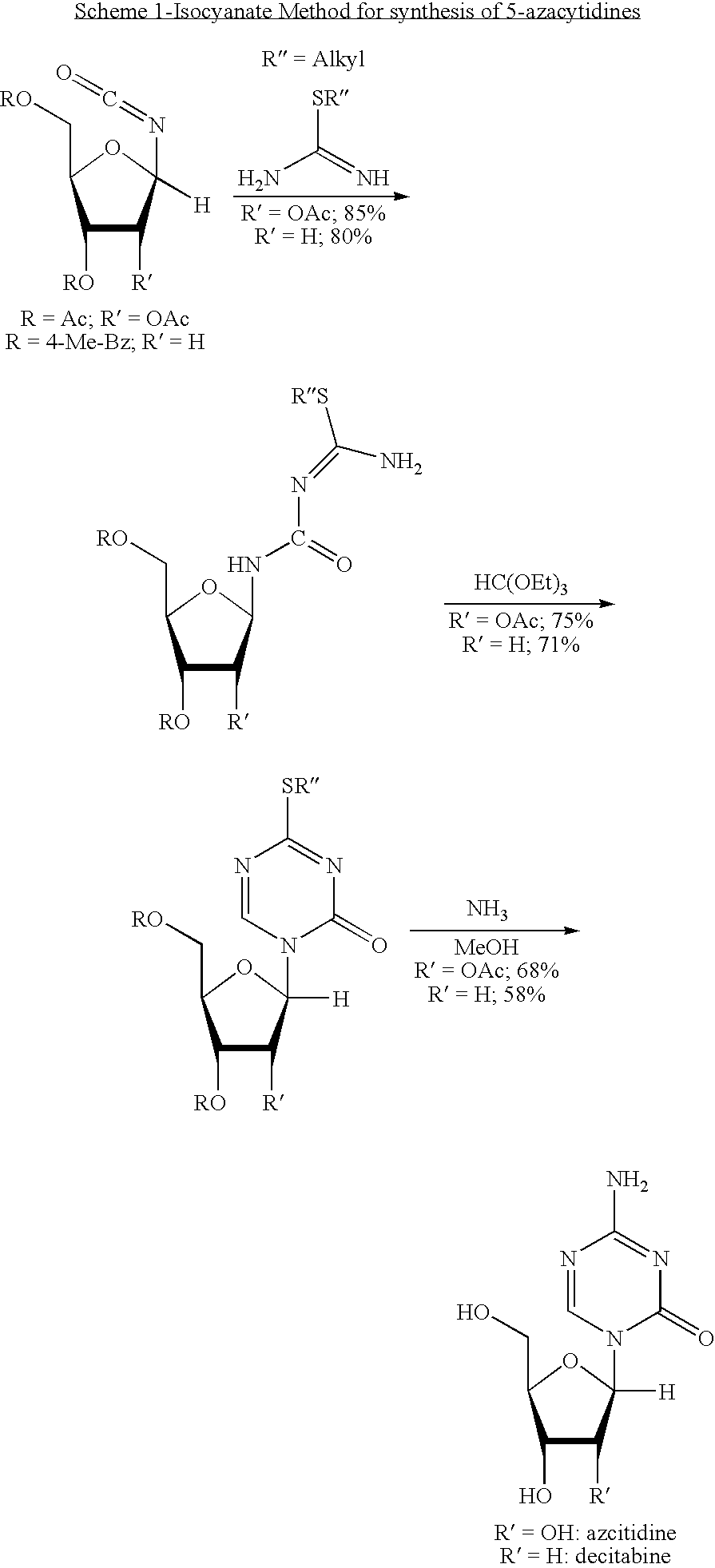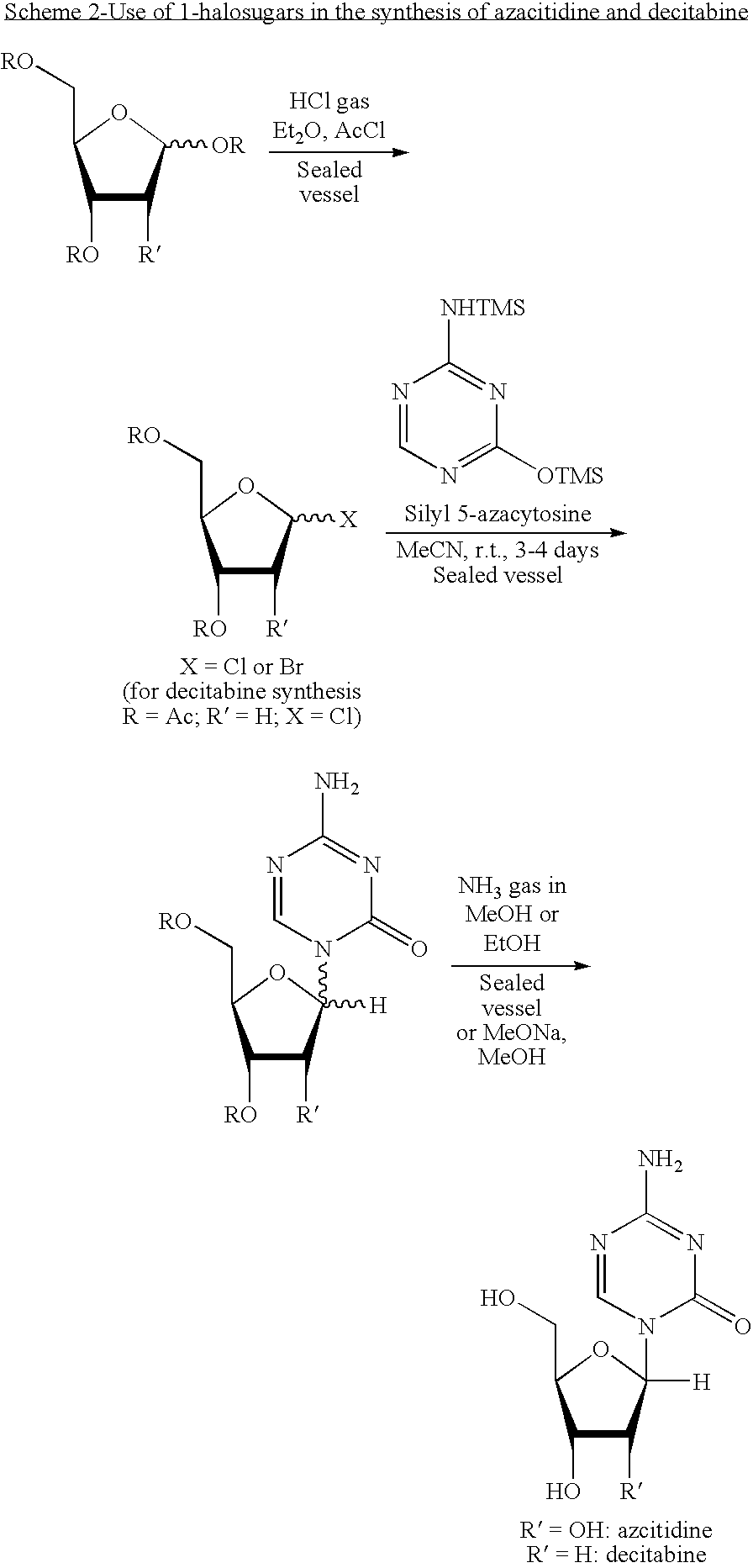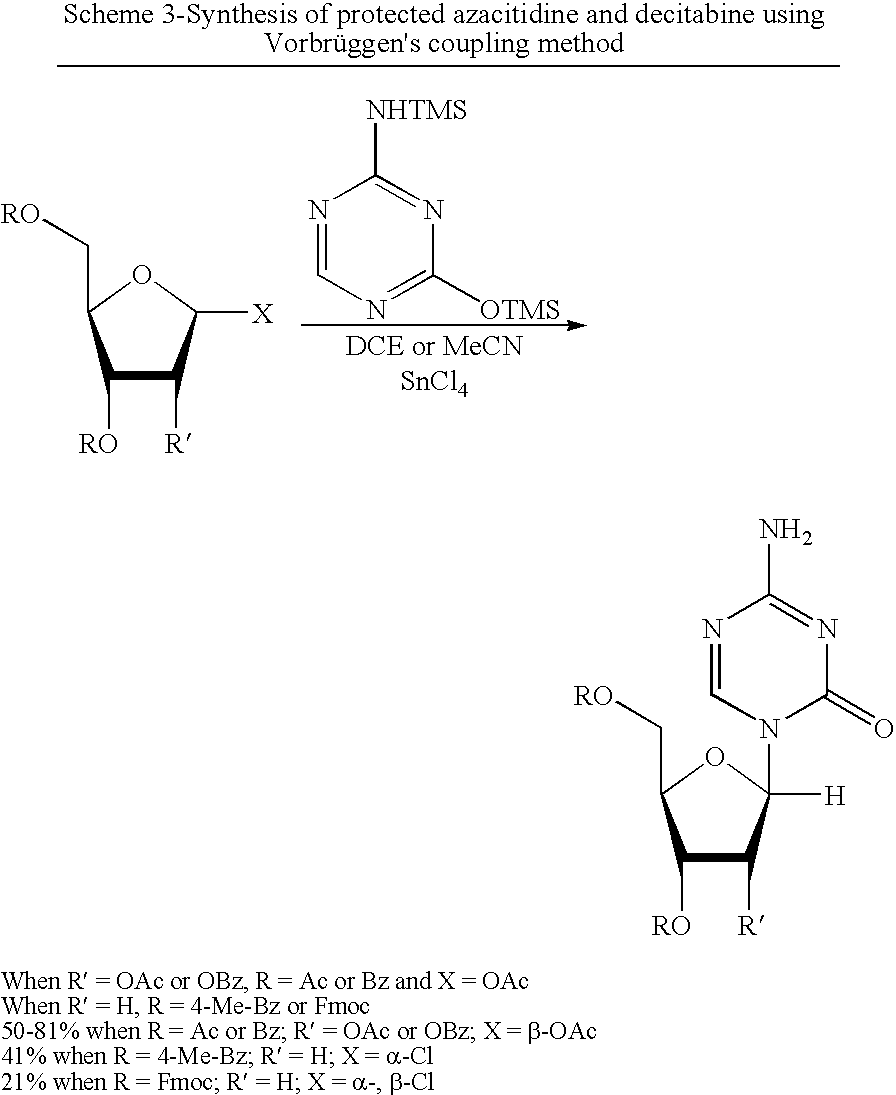Process for making 5-azacytosine nucleosides and their derivatives
a technology of azacytosine and nucleosides, which is applied in the field of process for making 5azacytosine nucleosides and their derivatives, can solve the problems of difficult storage of isocyanate, inefficient and less desirable commercial production, and difficult to store. the effect of isocyanate, high boiling point and high polarity
- Summary
- Abstract
- Description
- Claims
- Application Information
AI Technical Summary
Benefits of technology
Problems solved by technology
Method used
Image
Examples
example 1
Preparation of 2-[(trimethylsilyl)amino]-4-[(trimethylsilyl)oxy]-s-triazine(silyl 5-azacytosine)
[0083]
[0084]A mixture of 5-azacytosine (7.33 Kg), HMDS (33.9 Kg) and ammonium sulfate (0.44 Kg) was heated at reflux (about 115-135° C.) and stirred for 16 hours. After the reaction was complete, the slurry was cooled to 118° C. and then filtered through a bed of celite and rinsed with HMDS (5.6 Kg). The silylated 5-azacytosine solution was cooled to 35° C. and the solution was cooled to 18° C., stirred at 18° C., for not less than 6.5 hours and then filtered. The solid was washed twice with HMDS (5.6 Kg each) and dried under vacuum at ≦70° C. for 9.5 hours to obtain 14.19 Kg of white silyl 5-azacytosine (87%).
example 2
Coupling of Silyl 5-Azacytosine to Sugar and Deprotection
[0085]
[0086]A mixture of 2-[(trimethylsilyl)amino]-4-[(trimethylsilyl)oxy]-s-triazine (4.5 Kg), 1-O-acetyl-2,3,5-tri-O-benzoyl-β-D-ribofuranose (8.8 Kg), anhydrous MeCN (34.6 Kg) and TfOH (600 g) were heated at 55° C. for 12.5 hours. The reaction mixture was cooled to 45° C., DMSO (29 Kg) was added, and the MeCN was evaporated at an internal temperature of <50° C. under vacuum until about 54 L of the solution. The solution was cooled to 23° C. MeOH (13.9 Kg) was added followed by a solution of 30% NaOMe in MeOH solution (2.5 Kg) that was pre-diluted with MeOH (7.0 Kg). The solution was stirred at 23° C. for 35 minutes. When the reaction was complete MeOH (90.4 Kg) was added and the resulting slurry was stirred at 22° C. for 3 hours and 10 minutes and was then filtered and washed three times with MeOH (7.0 Kg each). The cake was dried under vacuum at below 70° C. for 9 hours and 20 minutes to give 3.2 Kg of 98.89% purity crude ...
example 3
Purification of Crude Azacitidine
[0087]Crude azacitidine (3.2 Kg) was dissolved in DMSO (11.8 Kg) at 20-40° C., filtered and the collected solids were rinsed with DMSO (10.1 Kg). The filtrate was cooled to 20-25° C. and MeOH (9.7 Kg) was added over a 30-minute period and then azacitidine seed crystals (30.6 g) were added and the mixture was stirred for about 1 hour at 23° C. More MeOH was added over a 4-hour and 13-minute period and the mixture was stirred at 20-25° C. for at least 10 hours, filtered and washed three times with MeOH (10 Kg each). The filter cake was dried under vacuum at less than ≦70° C. for 33 hours to furnish 2.6 Kg of API grade azacitidine (86% yield based on crude azacitidine).
PUM
| Property | Measurement | Unit |
|---|---|---|
| temperature | aaaaa | aaaaa |
| temperature | aaaaa | aaaaa |
| temperature | aaaaa | aaaaa |
Abstract
Description
Claims
Application Information
 Login to View More
Login to View More - R&D
- Intellectual Property
- Life Sciences
- Materials
- Tech Scout
- Unparalleled Data Quality
- Higher Quality Content
- 60% Fewer Hallucinations
Browse by: Latest US Patents, China's latest patents, Technical Efficacy Thesaurus, Application Domain, Technology Topic, Popular Technical Reports.
© 2025 PatSnap. All rights reserved.Legal|Privacy policy|Modern Slavery Act Transparency Statement|Sitemap|About US| Contact US: help@patsnap.com



